CPMR relies on the brilliance and motivation of many dedicated undergraduate students to preserve, identify, and create new content related to our holdings. These biographies reflect over 5 years' work by students whom have participated via classes, independent studies, and research seminars. Students are entirely responsible for the creation of these biographies and each biography is an ever-expanding, previously unavailable record of knowledge. Please contact us at chicanapormiraza@gmail.com with any concerns or updates to the information displayed here.
Student Curated Biographies
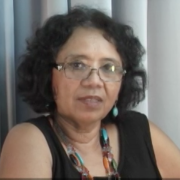 |
Anna Nieto-Gomez | "Where it is hostile there's always a little self-hate...always...because you're just projecting out. So, I guess that is the healing part." |
Anna NietoGomez was born on March 30, 1946 and was raised on the west side of San Bernadino County, California. NietoGomez recalls that growing up in a segregated community made her aware of racism from an early age. She also recounts growing up in a home where power dynamics between her mother and father were more pragmatic and egalitarian. It was these early insights and environments that would propel NietoGomez into a powerful journey of activism and revolutionary scholarly work. |
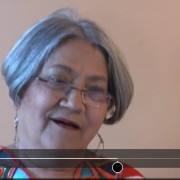 |
Martha Cotera | "My upbringing had a strong dose of progressive politics." |
Martha Cotera was born in Chihuahua, Mexico in 1938. Cotera describes her upbringing as having a strong dose of progressive politics as a result of her grandparents’ interest in Mexican politics. In 1946, Cotera and her mother immigrated to El Paso, Texas. Cotera was reluctant to move and encountered racist policies in both elementary school and high school while in Texas. Despite these challenges, she describes herself as a “total overachiever” in high school as she was a member of the Writing club, English club, and editor of the school newspaper. |
|
|
Barbara Carrasco | "I learned at that early age that the word 'no,' or rejection, you can really turn it around if you're determined to get some place." |
Barbara Carrasco holds a Bachelor of Fine Arts in art from the University of California, Los Angeles and a Master’s of Fine Arts from the California Institute of the Arts. She has been a muralist and artist in various media since her childhood.
|
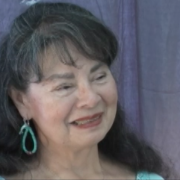 |
Gloria Arellanes | "I understand my power as a woman because I give life, I am a teacher, I am a nurturer, I provide spirituality teachings, and when we collectively come together as women, it's such a powerful thing." |
Gloria Arellanes was born in East Los Angeles in 1946, but for the majority of her life, she has resided in El Monte, California, living in the same home for over fifty years. Her father was a first generation Mexican-American whose family migrated to the United States from Chihuahua, Mexico, and her mother was a Tongva Native American. In the 1950s and 1960s, El Monte experienced extreme racial tension, and Arellanes witnessed race riots throughout her high school years. She attended college briefly before choosing to drop out, pursuing travel and more life experience. |
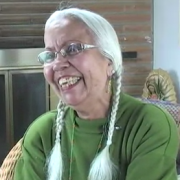 |
Alicia Escalante | “Don’t ever underestimate the power of a woman." |
Alicia Escalante was born in El Paso Texas, in 1933 to what she describes as a traditional family. She was the second oldest of seven children, and she shared an intense bond with her mother. After 15 years of marriage, Escalante’s mother decided to divorce her father due to his infidelity, alcoholism and abuse. At the divorce court proceedings, her father was granted custody of all seven children, because of her mother’s lack of employment and housing. |
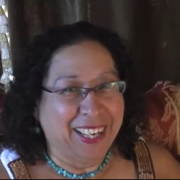 |
Yolanda Alaniz | "I am a socialist feminist because I strongly believe that everybody can someday be equal and that we can end the oppression that we as 3rd World Women as well as other oppressed groups face." |
Yolanda Alaniz was born in Brownsville, Texas and raised in Sunnyside, Washington in the Yakima Valley where she and her family worked as farmworkers. Tired of earning very low wages, her mother organized rallies along side other farm workers and most notably union leader Caesar Chavez to protest the unjust conditions and unfair wages many workers faced. |
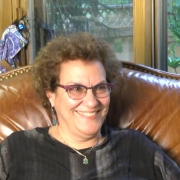 |
Ana Luisa Cardona | "That probably was influencing why my parents were being so protective because it was the 60s, and things were changing, and they didn't understand this world, or me, and why I was beginning to do the things I was doing." |
Ana Luisa Cardona was born on June 11, 1950 in the Bronx, NY. Her Puerto Rican parents raised Cardona with her brother in a traditionally Jewish neighborhood that slowly evolved to a multi-ethnic minority space. In elementary school, Cardona was placed in a special education class and tracked into lower ability-level classes because she was shy, but she soon grew out of her shyness thanks to dance classes. Her mother ensured that Cardona’s first language was English and that Cardona had access to equitable education by enrolling her in parochial school. |
|
|
Juana Gonzales | "Chicana feminism is to be yourself." |
Juana Maria Gonzales’s involvement with the Chicana movement started in her hometown of Mercedes, Texas. Born in 1948, Gonzales was the second oldest of eleven children raised in a strict Catholic family in south Texas. From an early age, her family dynamics made her aware of gender disparities and how her identity as a woman changed the way she moved in the world. This realization propelled Gonzales to become interested in women’s issues such as the concept of autonomy and rape culture. |
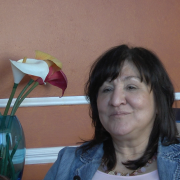 |
Angela "Angie" Reyes | "For me, you have two choices when you're faced with things like that [racism] growing up: you either internalize it and become ashamed of who you are...or you become radicalized." "I was raising four children as a single parent in the community when I was going to funerals for kids every other week...every other week." |
Angela Reyes was born on October 2,1954 and has lived and served in the community of Southwest Detroit ever since. Throughout her time from elementary to high school, Angela recounts coming face-to-face with prejudicial attitudes from classmates and teachers, experiences that forever marked her own developing, personal identity as a Mexican woman with indigenous roots. |
